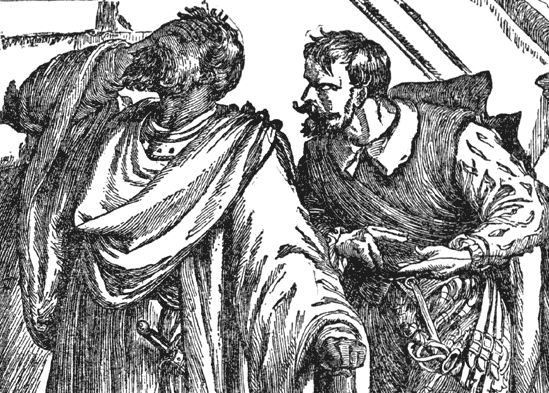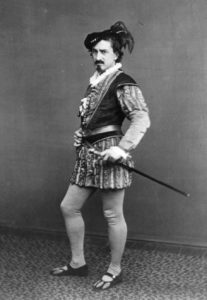The Shakespeare Answers category is here to answer questions people may have about Shakespeare’s work. If you’re just looking for the homework answers then you’ll find them here. I don’t love that, but I look at it this way. First, I can’t stop you, and if you didn’t find the answer here you’ll easily find it elsewhere. Second, by answering the question here maybe I can convince you that Shakespeare is interesting and worth learning more about.
Like so many of Shakespeare’s plays, we don’t actually see the title figure in the first scene. Othello opens with Iago and Roderigo standing outside the window of Brabantio, a Venetian senator, and father to Desdemona.
Roderigo lusts after Desdemona, and Iago knows this.
Desdemona has run off with Othello, and Iago knows this. Iago does not like Othello, to put it mildly.
Brabantio will not be happy to discover that his daughter as run off with Othello, and Iago knows this.
Iago’s manipulation drives everything in this play. He wants to get Othello in trouble, possibly to the point of having his command stripped, and sees an opportunity to use Roderigo as a puppet in making that happen.
So here we are, standing outside Brabantio’s window when the two begin hurling some of the vilest, most racist comments you’ll find in all of Shakespeare:
Even now, now, very now, an old black ram
Is topping your white ewe……the devil will make a grandsire of you…
…you’ll have your daughter covered with a Barbary horse…
It is Iago, not Roderigo, that hurls all those comments, as well as the most famous one:
…your daughter and the Moor are now making the beast with two backs.
But, here’s the thing. When Brabantio asks for their names, the only one to answer is Roderigo. Iago’s not stupid. Roderigo still thinks that the plan is some version of “we’re going to get Othello in trouble by telling on him,” not fully appreciating the level of psychological manipulation going on.
Once Brabantio comes down the stairs, Iago runs for it. He tells Roderigo:
…for I must leave you:
It seems not meet, nor wholesome to my place,
To be produced–as, if I stay, I shall–
Against the Moor
Which translates as, “It’s not a good idea for people to see me here, speaking out against my boss.” Which is true. You can’t play the puppet master once people realize that you’re the one pulling the strings, and then realize that you’ve got strings attached to them as well.
Does that make him a coward? Hurling insults behind the mask of anonymity and then fleeing into the night? That would suggest that Iago feels some degree of remorse or shame for his actions, which is hardly accurate.
The scene does a great job of setting up both characters. Roderigo is easily manipulated here and will be again.


 What does that all mean? Iago was lobbying for the lieutenant’s position under Othello (“his Moorship”) and even had some high-powered citizens/politicians (“great ones of the city”) go and offer their personal recommendation, only to find that Othello had already chosen Michael Cassio. Iago is not happy with this decision, and has nothing good to say of Cassio, who has no battle experience (as Iago does), and is instead what today might be called “book smart.”
What does that all mean? Iago was lobbying for the lieutenant’s position under Othello (“his Moorship”) and even had some high-powered citizens/politicians (“great ones of the city”) go and offer their personal recommendation, only to find that Othello had already chosen Michael Cassio. Iago is not happy with this decision, and has nothing good to say of Cassio, who has no battle experience (as Iago does), and is instead what today might be called “book smart.”